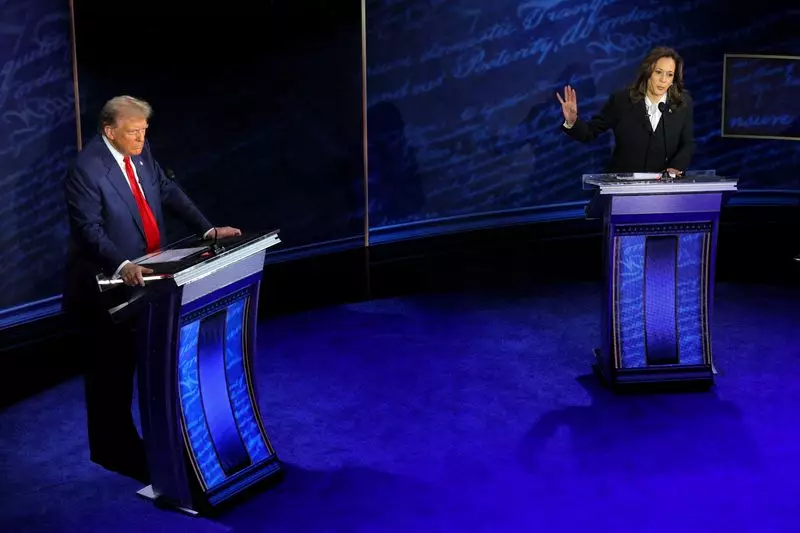As the U.S. approaches its pivotal presidential election, the resulting political climate is having significant repercussions on corporate investment strategies. A recent survey involving chief financial officers (CFOs) from a cross-section of companies has revealed that nearly one-third of these executives are grappling with uncertainties related to the upcoming election. This hesitation is likely to manifest as a dampening effect on economic growth, at least in the short term, as businesses adopt a cautious approach towards their investment decisions amidst swirling political dynamics.
The collaborative research effort between the Atlanta and Richmond Federal Reserve Banks and Duke University’s Fuqua School of Business paints a somber picture in which 21% of CFOs indicated that their firms had postponed essential investments due to concerns about the election. Additionally, over 15% reported that their investment plans had been curtailed. More than 30% of companies surveyed expressed that election-induced uncertainty had some impact on their financial strategies. In stark contrast, a significant 64% reported no discernible effects, highlighting the varying degrees of political anxiety that businesses face.
An analysis of the firms most impacted by election uncertainty reveals a trend among less optimistic executives who prefer to stay on the sidelines rather than take risks in a potentially volatile market environment. These cautious CFOs are more inclined to invest in equipment that aids in cost reduction rather than expanding capacity or maintaining existing assets. Such behavior suggests a deep-seated anxiety about the economic trajectory amid fierce political divisions.
Brent Meyer, an economist affiliated with the Atlanta Fed, and Daniel Weitz, the survey’s director, discovered that the overarching sentiment in these companies was not geared towards recovering any lag in growth. In fact, these leaders do not foresee a rebound in growth rates in 2025, reflecting a deeper crisis of confidence that indicates long-lasting effects on the corporate landscape.
Despite these reservations, the survey unveiled a nuanced reality. Many CFOs still express a degree of optimism about their own enterprises and the broader U.S. economy. Approximately 69% conveyed a positive outlook for their own companies, while 60% felt similarly about national economic prospects. This optimistic sentiment is largely unchanged from previous quarterly surveys, indicating a split between a resilient belief in individual corporate performance and a wider mistrust in the overall economic climate.
However, the stark polarization in the political arena, especially with the sharp contrast between the Democratic and Republican candidates, adds layers of complexity to these corporate sentiments. The impending decision between Vice President Kamala Harris and former President Donald Trump looms over investment plans as firms grapple with the implications of each candidate’s policies. Notably, the survey did not delve into partisan preferences, which may have colored the responses.
Regarding policy concerns influencing CFOs, the financial officers highlighted regulatory and monetary policies as their primary worries. Close to 60% of respondents viewed regulatory policy as a pressing issue, while nearly 59% pointed to monetary policy concerns. The latter shows continuity in apprehensions tied to the Federal Reserve’s stringent interest rates aimed at controlling inflation, which, until recently, had overshadowed corporate tax policy concerns. Interestingly, only a mere 8% identified inflation as their top concern, indicating a shift in focus towards longer-term regulatory environments.
The evolution of investment strategies and corporate concerns showcases a reactive rather than proactive mindset among CFOs. With financial officers carefully weighing their options against an uncertain political backdrop, the implications for economic growth become evident. Reduced investments not only threaten short-term growth projections but could also hamper the capacity for long-term innovation and development.
As the U.S. navigates the complexities of its electoral landscape, corporate America finds itself at a crossroads. The uncertainty stemming from the electoral process has led many CFOs to pause or reconsider their investment plans, potentially stunting economic growth. While a degree of optimism persists among many businesses, the overshadowing political anxieties bear watching closely, as they could profoundly influence corporate strategies and the overall economic outlook for years to come. Decisions made in this critical window will shape the trajectory of economic performance in a post-election landscape, and the ramifications of these choices will likely echo throughout the U.S. economy.

